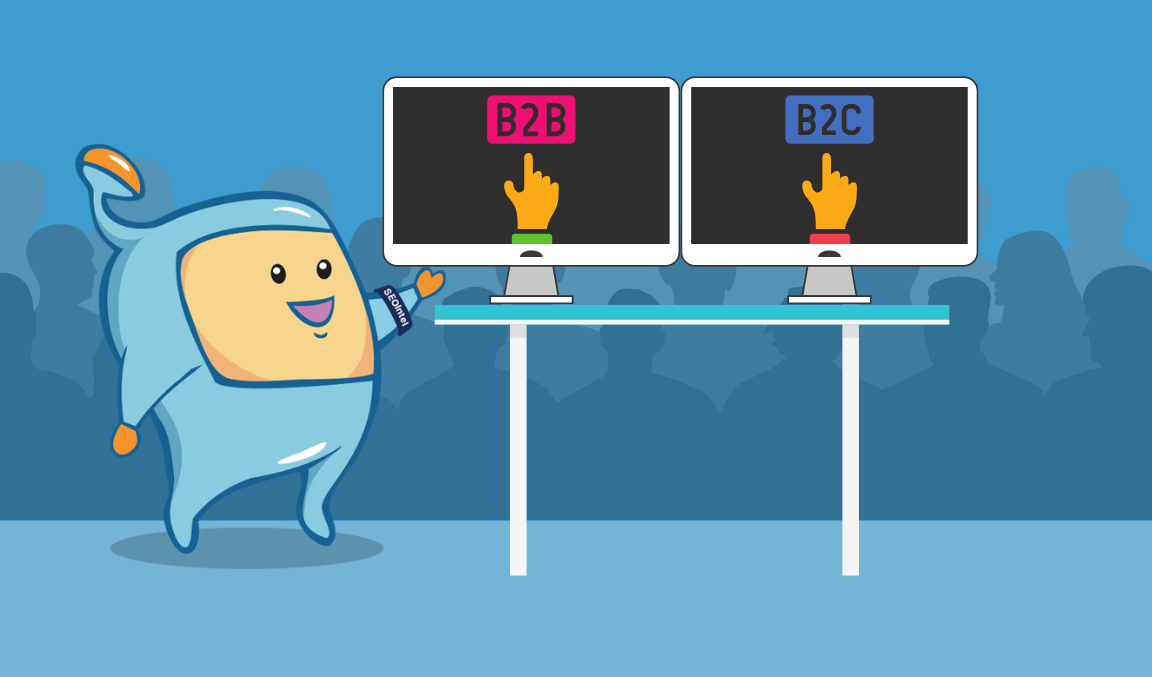B2B content marketing has become an indispensable strategy for businesses aiming to connect with their target audience, establish authority in their industry, and drive meaningful results.
B2B companies must adopt a strategic approach to create and distribute valuable content that resonates with decision-makers and drives engagement.
Whether it's through informative blog posts, in-depth industry studies, engaging videos, or personalized email campaigns, B2B content marketing serves as a powerful tool to attract, educate, and convert prospects into loyal customers.
In this article, we will delve into the fundamentals of B2B content marketing, explore its significance, and unveil effective strategies to maximize its impact in the competitive business landscape.
Here is what you will read in this article:

B2B content marketing refers to the strategic approach of creating and distributing content that is specifically tailored to businesses and professionals in the B2B (business-to-business) space.
The goal of B2B content marketing is to attract, engage, and ultimately convert the target audience, which primarily consists of decision-makers and key stakeholders within other businesses.
Unlike B2C (business-to-consumer) content marketing, which targets individual consumers, B2B content marketing focuses on reaching and influencing individuals who are involved in making purchasing decisions on behalf of their organizations.
This audience includes executives, managers, department heads, and other professionals who play a role in the buying process.
The content created for B2B content marketing aims to provide value, education, and insights that are relevant to the target audience's specific needs, challenges, and interests.
It is often informative, authoritative, and tailored to address the pain points and goals of businesses.
B2B content can take various forms, such as blog posts, articles, whitepapers, case studies, e-books, videos, webinars, podcasts, and infographics.
The key objective of B2B content marketing is to establish the brand as a trusted resource and industry thought leader.
By consistently delivering high-quality content, businesses can build credibility, demonstrate expertise, and foster trust among their target audience.
This helps to strengthen relationships, enhance brand awareness, and differentiate the business from competitors.
B2B content marketing also plays a crucial role in the customer journey.
It guides prospects through the awareness, consideration, and decision stages by providing valuable information and addressing their concerns at each step.
The content acts as a means to nurture leads, build relationships, and ultimately drive conversions.

Content marketing holds significant importance for B2B companies due to its high return on investment (ROI) and proven effectiveness.
According to Statista, 30% of marketers consider content to have the "highest ROI" among various marketing channels.
This explains why a substantial 91% of B2B marketers utilize content marketing to promote their businesses.
Content marketing offers several benefits for B2B companies, including:

B2B content marketing and B2C content marketing differ in several aspects due to their distinct target audiences and marketing objectives.
Here's a comparison between B2B and B2C content marketing:
B2B Content Marketing: B2B content marketing focuses on a specific audience of professionals and decision-makers within businesses.
The content is tailored to address the needs, challenges, and interests of this audience, providing solutions and insights that are relevant to their roles and responsibilities.
The B2B audience is more focused and typically includes executives, managers, and other key stakeholders involved in the buying process.
B2C Content Marketing: In contrast, B2C content marketing targets a broader consumer audience.
The content aims to appeal to individual consumers who may be interested in purchasing products or services for personal use.
The B2C audience is diverse and encompasses individuals from various demographics, interests, and preferences.

B2B Content Marketing: B2B content is primarily distributed through channels that are most effective in reaching the target audience within the business context.
These channels often include email marketing, industry-specific conferences and events, search engines, and the company's own website.
B2B content is less likely to be widely shared on social media platforms compared to B2C content.
B2C Content Marketing: B2C content marketing heavily relies on social media platforms like Facebook, Instagram, Twitter, and Pinterest for distribution.
B2C companies leverage the wide reach and engagement potential of these platforms to connect with their consumer audience.
Additionally, B2C content may also be distributed through paid advertising, influencer partnerships, and traditional media channels.

B2B Content Marketing: B2B content often takes the form of informative and educational resources such as whitepapers, case studies, in-depth articles, industry reports, and webinars.
The content focuses on providing practical insights, actionable strategies, and data-driven analysis to help businesses make informed decisions and solve complex challenges.
B2C Content Marketing: B2C content is more diverse in terms of formats and tends to be more visually appealing and emotionally driven.
B2C content may include product demonstrations, customer testimonials, lifestyle-oriented blog posts, entertaining videos, visually captivating social media posts, and interactive experiences.
The content aims to evoke emotions, create brand affinity, and drive immediate purchase decisions.
While there are differences between B2B and B2C content marketing, it's important to note that both strategies share common goals, such as building brand awareness, driving engagement, and ultimately generating revenue.
The key lies in understanding the unique characteristics of the target audience and tailoring the content and distribution channels accordingly to achieve the desired outcomes.

Having a well-defined B2B marketing strategy is crucial for businesses as it enables them to effectively target and engage with other businesses, align their messaging to specific needs, and build long-term relationships, resulting in increased sales and business growth.
Without a solid B2B marketing strategy, businesses may struggle to differentiate themselves in the market, miss out on valuable opportunities, and face challenges in reaching their target audience effectively.
Here are eight solid B2B Content Marketing Strategies to help your marketing efforts.
Industry studies are highly impactful B2B content pieces.
By conducting and sharing comprehensive studies within the industry, B2B companies can position themselves as authoritative sources and generate valuable backlinks.
These studies offer data-backed insights and analysis that attract both the target audience and other industry publications.

Utilizing email newsletters is an effective way to nurture leads and engage with existing customers.
By providing value-packed content, B2B companies can build relationships, maintain regular communication, and reinforce their brand presence.
Newsletters serve as a platform to share industry updates, company news, valuable resources, and exclusive offers.
LinkedIn is a powerful social media platform for B2B professionals.
By leveraging LinkedIn's organic reach and targeting capabilities, B2B companies can establish thought leadership, engage with their target audience, and expand their network.
Posting relevant and valuable content on LinkedIn, whether in the form of text-based posts, articles, or videos, can help drive visibility, generate leads, and build meaningful connections.
Complete guides are comprehensive resources that delve deep into a specific topic relevant to your B2B audience.
These guides cover the fundamentals, techniques, strategies, and examples related to the subject matter.
By creating in-depth and authoritative guides, you position your brand as a valuable source of knowledge and expertise.
Complete guides also tend to perform well in search engine rankings, attracting organic traffic and establishing your brand's authority in the industry.

Video has become an increasingly popular and effective content format across various platforms.
B2B companies can leverage video content to engage and educate their target audience.
Whether through informative tutorials, industry insights, customer testimonials, or product demonstrations, video content can capture attention, convey complex information effectively, and create a memorable brand experience.
Investing in high-quality and engaging B2B video content can help you stand out and make a lasting impression on your audience.

Email marketing remains a powerful tool for content promotion in the B2B space.
Building a strong email list of subscribers who are genuinely interested in your industry and offerings allows you to directly reach out to them with valuable content.
By crafting compelling email campaigns, you can drive traffic to your content, nurture leads, and encourage conversions.
Personalization, segmentation, and automation can enhance the effectiveness of your email marketing efforts, ensuring that your content reaches the right audience at the right time.
Keyword research plays a crucial role in B2B content marketing.
To maximize the impact of your content, it's essential to focus on keywords with high commercial intent.
These keywords indicate that the searchers are actively looking for solutions or products related to your B2B offerings.
By targeting these keywords in your content, you increase the likelihood of attracting qualified leads and potential customers.
Conduct thorough keyword research and incorporate high-commercial-intent keywords strategically in your content to drive relevant traffic and increase conversion opportunities.

Continuously generating fresh and relevant topic ideas is vital for sustaining your B2B content marketing efforts.
In addition to keyword research, you can explore other avenues to discover new topics.
Online communities, such as LinkedIn groups or industry-specific forums, provide valuable insights into the challenges and questions your target audience faces.
Monitoring these communities and identifying common queries or areas where information is lacking can inspire new content ideas.
Additionally, blog comment sections, both on your own blog and others within your industry, can offer valuable feedback and discussion points that can spark ideas for future content.
B2B content marketing is a vital strategy for businesses operating in the B2B landscape.
By creating and distributing valuable, relevant, and engaging content, B2B companies can effectively attract, engage, and convert their target audience.
Throughout this article, we explored the fundamental elements of B2B content marketing, including its definition and significance.
We also explored the differences between B2B and B2C approaches.
We discussed effective B2B content marketing strategies, including publishing industry studies, sending out newsletters, utilizing LinkedIn content, creating comprehensive guides, investing in video content, promoting through email marketing, focusing on commercial intent keywords, and finding fresh topic ideas.
Implementing a comprehensive B2B content marketing strategy allows businesses to enhance brand awareness, establish credibility, foster customer trust, and drive revenue growth.
By consistently delivering high-quality content that addresses the needs and challenges of their target audience, businesses can attract and engage prospects, nurture leads, and guide them through the customer journey.
To succeed in B2B content marketing, it is essential to have a deep understanding of the target audience, utilize appropriate distribution channels, and create resonating content formats.